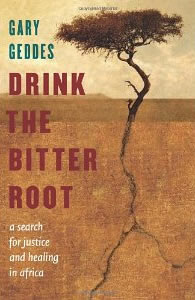Book Notes
 Gary Geddes, Drink the Bitter Root: A Search for Justice and Healing in Africa (Berkeley: Counterpoint, 2011), 232pp.
Gary Geddes, Drink the Bitter Root: A Search for Justice and Healing in Africa (Berkeley: Counterpoint, 2011), 232pp.
The Canadian travel writer and human rights advocate Gary Geddes has written and edited over forty books that have been translated into seven languages and won a dozen awards. In this volume, at the age of sixty-eight he visits a land his extensive travels had never covered, Africa, and in particular a half-dozen hot spots. Successive chapters tell of his travels in Uganda, Rwanda, Democratic Republic of Congo, Ethiopia, and Somaliland (which seceded from Somalia in 1991). What interests him most, he writes, are not the "statistic enormities" like 800,000 killed in 100 days in Rwanda, but the personal stories of individual people. And so while he has done his academic reading about these places, and sprinkles his narrative with literary flourishes, he mainly tells stories about the people he interviewed — rape victims, child soldiers, doctors, journalists, poets, aid workers, NGOs, lawyers at the ICC, and internally displaced people.
Geddes is well aware of the ambiguities that attend Africa. Its problems are many and complex. The legacy of colonialism has been exacerbated by neocolonial and corporate greed, not to mention corruption, incompetence, and dysfunction in African leadership. Foreign aid is a bane and a blessing; I was shocked to read that ninety per cent of Ethiopia's budget comes from foreign aid (139). Yes, ethnic tensions are important, but so are economics, politics, natural resources, religion, and environmental degradation. The UN is a blundering bureaucracy, but it's still the best game in town. He writes with passion about human rights, but is painfully aware that he's spent "too much time at the desk, too little in the arena facing the lions." Then there's the continual tension between the need for restoration and reconciliation in Africa, and the desire for revenge and retribution, or, as his subtitle puts it, the tension between healing and justice. As Maria Vargas of the Danish Refugee Council in Somaliland put it, "We do our best, but it's not easy."
I liked how Geddes situates himself as a beneficiary to receive from Africa rather than a benefactor to give. He admits that his efforts to identify with Africans could feel intrusive and false. He begins his book with the wisdom of his fellow Canadian Jean Vanier, founder of the L'Arche homes for the mentally and physically handicapped: "People who are weak have something to bring to us, that they are important people and it's important to listen to them. In some mysterious way, they change us. Being in a world of the strong, the powerful, you collect attitudes of power and hardness and invulnerability… It is vulnerability that brings us together." There's nothing ambiguous about Vanier's wisdom when applied to what Africa can contribute to the west, which has its own many and complex problems.


